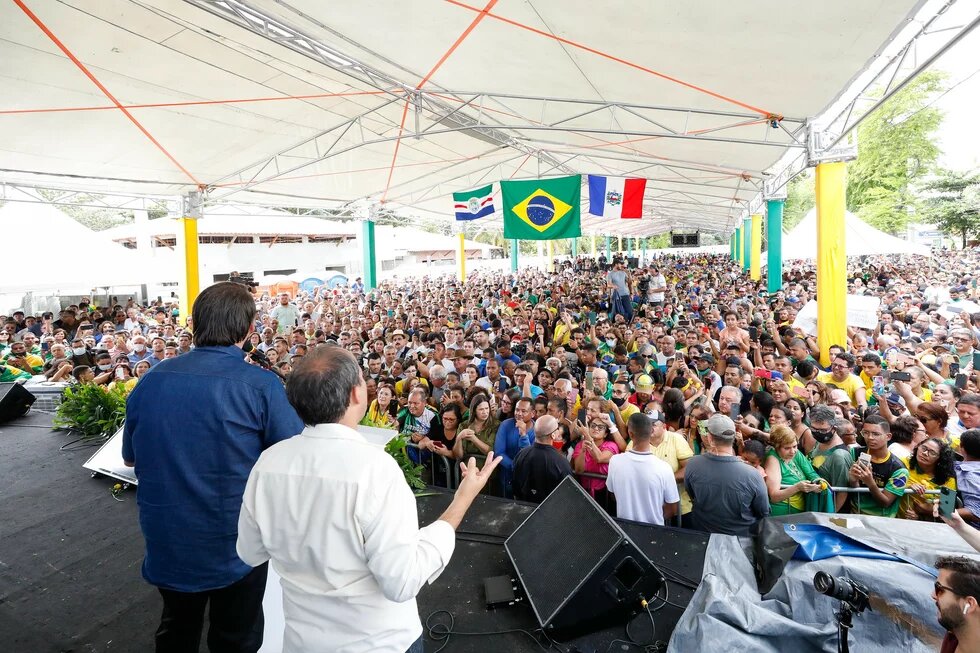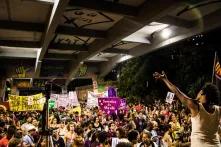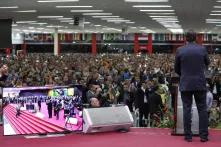Determined to stay in power, Brazil’s incumbent president Jair Bolsonaro borrows from Donald Trump’s playbook and is preparing the ground for a stolen election myth. He rose to power by learning how to mobilize voters from Barack Obama – and by flooding the internet with fake news.

On September 20, President of Brazil Jair Bolsonaro, for the fourth consecutive year, headed the delegation of the General Assembly of the UN. At the 77th General Assembly, Bolsonaro affirmed that he would spare no effort to combat the pandemic. The facts show that his administration delayed the purchase of the vaccine and encouraged practices against the recommendations of the WHO. The president also affirmed that he would protect the Amazon, but the data shows record deforestation. He praised the country’s economic development, even though Brazil returned to the World Hunger Map with 33 million people lacking access to food.
This speech, based on disinformation, translated into Arabic, English, Russian, Spanish, Chinese and French, is already familiar to Brazilians, and it is the platform of the president’s reelection campaign. Disinformation is one of the foundations of the modus operandi of this administration, which during four years has waged media battles with various opponents – such as members of Brazil’s Congress, ministers of the Supreme Federal Court and artists.
Fake news sow doubts about integrity of institutions
The integrity of the electoral process, with expressions of distrust of voting machines and electoral polls, has been one of the principal recurring topics in fake news in the 2022 campaign. In July, Bolsonaro called a meeting with top diplomats from various nations and, without presenting any evidence, attacked Brazil’s voting machines and electoral process. The meeting was transmitted on live TV and streamed online. The livestreams of the meetings totaled more than 1.2 million views on Bolsonaro’s official Facebook, Instagram and YouTube profiles, in less than 24 hours from the time of posting. The videos were taken off the air as ordered by the Supreme Electoral Court and by YouTube itself, in accordance with its election integrity policy.
The most popular fake news of the campaign among evangelical voters was this statement: “The PT [Workers’ Party] will close churches.” The PT, the party of Brazil’s former president and currentcandidate Luiz Inácio Lula da Silva, is leading in presidential polls. The topic has been exploited in previous elections, considering that evangelicals represent 32% of Brazilians, according to Datafolha. In 2020, the president mentioned the subject on Twitter, digital influencers posted content, news portals in favor of the administration published distorted reports, and many messages in groups on WhatsApp and Telegram disseminated this narrative. On August 16, 2020, the official opening day of election campaigning, there was a spike in mentions of the word igreja (“church”) on Twitter, the second largest jump since the beginning of that year, totaling approximately 69,000 posts.
A few days after the first round of the presidential election, a growing number of posts attempted to discredit Datafolha, a highly reputable research institution in Brazil. Supporters of Jair Bolsonaro distorted the results of Datafolha polls in 2018, claiming that they were erroneous, as Fernando Haddad had been indicated as the winner, rather than Bolsonaro. Disinformation regarding polls is not unique to that election, but social networks facilitated its dissemination.
Platforms' responsibility to control disinformation
The problems of disinformation, hate speech and political violence are related to the business model of the platforms. Therefore, this becomes a structural matter. Content with these characteristics generates more engagement, which is one objective of the companies as engagement generates profit. In Brazil there is no specific regulation regarding social networks, although in these elections, the Supreme Electoral Court reached an understanding with the platforms. Yet, efforts by platforms to prevent uprisings against democratic order or interference in peaceful transitions of power (short of an explicit call to violence), were based on weak policies, if they existed.
In an institutional crisis scenario, during or soon after the election, these digital ecosystems can become meeting points for the organization and promotion of antidemocratic action. According to a group of digital-rights defense organizations, actions taken so far by the platforms have been insufficient to “contain political, gender and racial violence.” Moreover, none of them include measures to curb the denial of climate change and science.
The 2022 election will take place on fertile ground for the dissemination of disinformation on all social platforms. In August, Global Witness conducted an experiment with Facebook and concluded that the efforts of the platform to protect electoral integrity in Brazil may be failing. Facebook did not detect content with disinformation in ads that violated its internal policy.
According to Ana Regina Rego, coordinator of the National Network to Fight Disinformation, content that “combines facts with lies, with fraud, decontextualizations, with a sensationalist aesthetic, has a 70% higher potential to become viral than real information.” One untruth can reach disproportionate dimensions, as occurred in the United States when followers of Donald Trump invaded the Capitol in January 2021, convinced that there had been fraud in the election when the former president lost to Democrat Joe Biden. Bolsonaro takes inspiration from Trump and insinuates that he might not recognize a possible defeat.
The legacy of 2018 in the current election
After the digital campaign of Barack Obama in 2007 - 2008, analysts had asked the question when the first “internet election” would take place in Brazil. That time had come in the year of Jair Bolsonaro’s campaign, after two decades of commercial internet in the country. The form of the electoral races in the 2018 election was a product of the dynamics of social networks, on which Brazilians spend a good part of their days, consuming and sharing information. According to a report by the consulting firm AppAnnie, in 2021, users in Brazil spent almost five and a half hours per day on their smartphones, tying with Indonesia at the top of the world ranking.
Bolsonaro’s victory in 2018 came without the aid of the classical determinants of election outcomes, such as air time on television, heavy funding, party structure and state-provided speaking platforms. He won by mastering the communications apparatus offered by social networks. His campaign did not just win at the polling stations, it won online, by using mass messaging via WhatsApp, and by flooding social media with fake news and image and rhetoric of the then-candidate.
In content, the brand was a myriad of resentments, violence and moralism aimed at a population that was very unhappy with the socioeconomic crisis that had taken hold in Brazil, and with the fact that marginalized groups such as women and the Black and Indigenous populations had managed to advance their agendas and claim their rights. After the 2018 election, civil society, legislators and researchers saw the impact of the narratives of disinformation and how the skill of using the networks favored hate speech and antidemocratic speech. As a result, the creation of legislative bill 2.630 began, nicknamed “the Fake News Bill.” It was the most ambitious undertaking to regulate the internet in Brazil since the Brazilian Civil Rights Framework for the Internet.
The first version approved by the Senate took the approach of monitoring, especially in the proposal to retain logs of all messages exchanged via WhatsApp in the country. But civil society organizations, many of them concentrated in the Coalização Direitos na Rede (Online Rights Coalition), feared that this measure would overreach and endanger free speech and mobilized to create a debate about the project in the Chamber of Deputies. Due to the efforts of all those interested, including big tech companies, the bill advanced, encompassing both consensual and controversial proposals. According to Francisco Cruz, director of InternetLab, the bill makes strides in the transparency of platforms and creates obligations for the public agents that use them; but dangerously, it shields lawmakers who violate the terms of use of these companies and oversimplifies the debate over remuneration of online journalistic content. There were attempts to get the bill approved before this year’s election, but they were unsuccessful. The discussion will have to be taken up again after the election cycle.
What does the future hold for Brazil?
A few days before the election, Brazilians who defend the guarantee of rights and democracy experience an anxiety mixed with hope, based on polls that show Bolsonaro might be voted out. But even if that occurs, it will not mean that Brazilian politics will be totally renewed. There is a radical right beyond Bolsonaro, which will reorganize itself in the new scenario. Further, the nation will remain scarred by terrible moments of political violence, like the murder of policeman and PT member Marcelo Arruda at his own birthday party by a Bolsonaro supporter who took exception to the Lula/PT theme of the celebration. This violence may still continue with some momentum.
The phenomenon of disinformation will still be a central topic, along with the others that occupy online platforms. The operation of the algorithms that run those platforms, in which our data circulates, is invisible to those who use them. It is in this opacity that extremist groups operate. Algorithmic systems dictate the distribution of messages that form part of the public arena in which the political directions of society are debated.The discussion of the regulation of networks in Brazil, the Fake News Bill and the regulation of artificial intelligence are extremely relevant questions that will be addressed by the public.
The researcher Sergio Amadeu, from the Universidade do ABC, affirmed that “we will have to be in a state of alert to guarantee that democracy prevails in the face of biased algorithmic modulation, digital militias, producers of disinformation that seek to impose an instrument of power that will devastate the respect toward differences.” He refers to the present moment, but this call to action will continue to be necessary after the election.
This article first appeared here: us.boell.org

